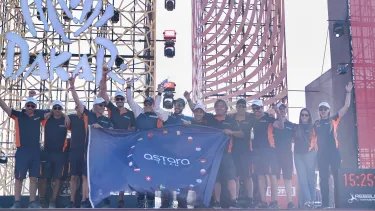Thanks to the use of 100% renewable synthetic fuel, the Astara Team competition cars achieved a zero emissions balance.
In this edition of the Dakar Rally, the measurement of the emissions range combines the team's own emissions scope 1) and indrect own emissions (scope 2) of all team vehicles, and those from personnel flights (scope 3). 33.71 tons of CO2 have been certifie, which will be offset by reforesting degraded areas in Colombia.
The team managed to combine an improvement in its sustainability equivalent (11.86 tons of CO2 less than last year) with greater competitiveness, finishing the 2024 Dakar Rally on the podium in the two-wheel drive vehicle category and in the Top15 overall.
The Astara Team has completed its participation in the 2024 Dakar Rally with a net zero CO2 emissions balance for the third consecutive year. In this edition, the merit was even greater, as the team was even more rigorous with its emissions measurement, combining the team's own emissions (scope 1) and indirect own emissions (scope 2) of all vehicles used by the team; and those from personal flights (scope 3); according to the GHG measurement protocol.
To achieve this goal, a new 100% renewable synthetic fuel was used in the competition cars in this edition. The Astara Team has been improving the formulation of this fuel year after year: in the 2021-2022 edition, the fuel came from 70% renewable energy; and in the 2022-2023 edition, it reached 90%. Thanks to the use of this 100% renewable synthetic fuel, the Astara Team cars that competed in the Dakar Rally this year had a zero emissions balance. This type of synthetic fuel is completely carbon neutral and its environmental impact is null, as the CO2 emitted into the atmosphere during its combustion is the same as that extracted from the air during its production.
The support vehicles and electric generators used by the team used 70% renewable synthetic fuel. The combination of synthetic fuels used by the team enabled an emissions reduction of 18.6 tons of equivalent CO2 into the atmosphere, a figure that would have been generated using traditional fuels. This reduction is equivalent to the emissions of an average car in the Spanish fleet (144g/km) for 130,000km / 8.6 years of average use (15,000km/year).
Taking into account the complete scope (scopes 1, 2, and 3 quantified), the Astara Team generated 33.71 tons of equivalent CO2 at the Dakar. Thanks to the work done, the impact was reduced by 11.86 tons compared to the previous edition of this event.
To achieve the net zero balance, the 33.71 tons of equivalent CO2 emitted will be offset by reforesting degraded areas in Colombia, through the Vichada Project for the production and planting of native tree species in the Orinoco. This program will also benefit the climate and fauna of an area with great biological diversity.
Astara TEAM: a sustainable, efficient and pioneering formula
The Astara Team has pioneered a sustainability movement in motor racing, based on synthetic fuels of renewable origin, which has been joined by the Dakar Rally, Formula 1 and MotoGP.
The team is a world reference in the use of synthetic fuels in motor racing thanks to its accumulated experience. Since the start of this project in 2021, the team has managed to reduce its emissions while increasing its competitiveness, in an event as difficult as the Dakar.
In the last Dakar, the Astara Team scored a podium result in the two-wheel-drive category and finished in the top 15 in the overall classification with the duo of Laia Sanz and Maurizio Gerini. The team's second car, with Patricia Pita at the wheel and Paolo Boggioni as co-driver, suffered a rollover in the first stage causing irreparable damage to the chassis of the Astara 02 Concept, forcing them to retire from the competition.
This adventure began in 2021, when Astara, one of the leading companies in mobility services, proposed an unprecedented challenge to the members of the Astara Team: building a project to compete at the highest level with sustainability as a prerequisite.
In the Dakar 2021-2022, the team used a formulation in the synthetic fuel in the competition vehicles that came from 70% renewable energy and managed to reduce CO2 emissions by this percentage. The following year, in the 2022-2023 edition, the Astara Team managed to improve the formulation to 90%.
In this edition, a synthetic fuel of 100% renewable origin has been used, with a completely neutral carbon footprint.
